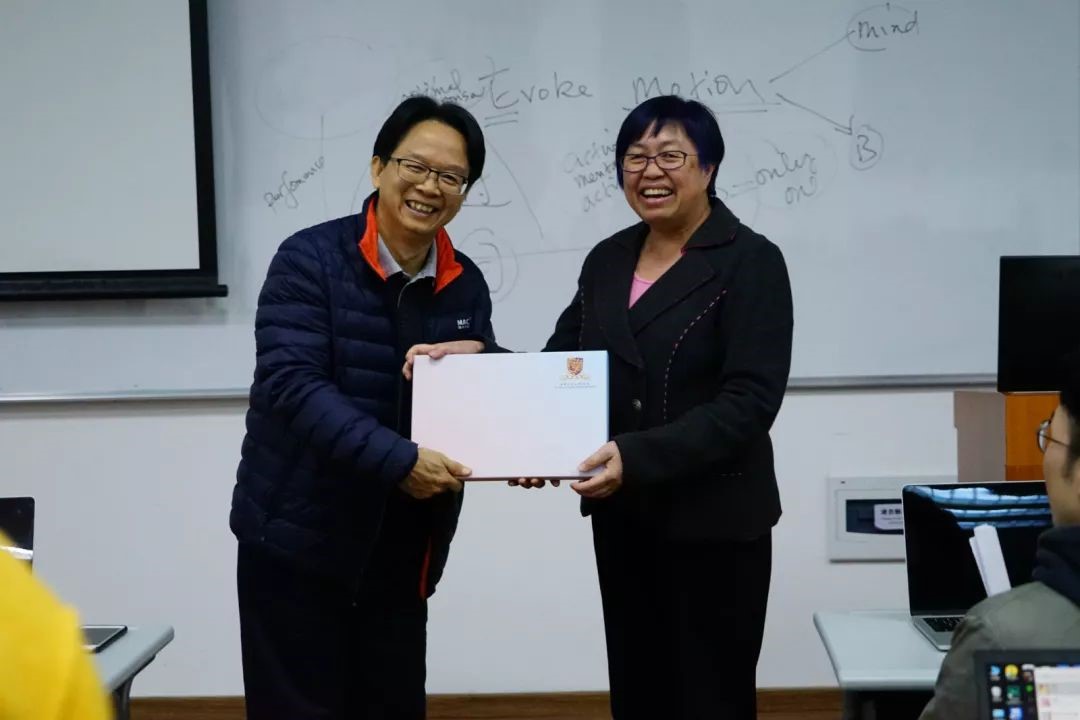Activity Review | Discovering The Secrets of Brain- The Neuroscience of Learning
In the evening of December 12, 2018, Prof. Freedom Leung from Shaw College of CUHK brought us a learning feast on neuroscience at F302, the multi-purpose hall.

At first, Master of Shaw College Prof. Janny Leung gave a brief introduction to Prof. Freedom Leung. Then the lecture officially started.

In the first part of the lecture, Prof. Leung introduced some basic knowledge about the neural plasticity. Some people consider that the human brain have a little change after a certain age, Prof. Leung, however, told us that according to the latest research of neural plasticity, the human brain is actually changing and learning every day.
In addition, Prof. Leung specifically mentioned the motor habit in our daily life for better explanation of the neural plasticity and played a game with the attendees at the scene. He asked the attendees to raise their two hands, and then crossed each other to see if the left hand or the right one was on the top. Prof. Leung said that no matter which hand we put on the top was virtually decided in an unconscious state, and such motor habits were actually controlled by the putamen.
Nevertheless, when you specifically change the habits and repeat them hundreds of times a day, after a while, you will find yourself putting the other hand on the top. This is also because the putamen has received the information sent by your body, and thus makes the corresponding changes.

In the second part of the lecture, Prof. Leung thoughtfully taught the students who were preparing for the finals to optimise the function of the brain and to improve the efficiency of brain learning.
In order to enable students to better understand how emotional experience helps our brain, Prof. Leung introduced the S-ABC (Stimulation-Affective Reaction- Body-Cognition) model. He then humorously used an example of encountering a snake to further explain this model. When we accidentally run into a snake, the amygdala in our brain would suddenly become sensitive and active, and then trigger a series of physical reactions, such as pupil dilation, dry mouth, accelerated heartbeat, shortness of breath, and decline of gastrointestinal digestion function, etc., through nerve conduction.

Therefore, in order to improve the efficiency of learning, we should firstly have great passion for what we are learning. Only in this way can we have a positive stimulus to our brain, thus improving the efficiency of the brain.
Possessing high-quality sleep could also benefit our learning behaviour. Speaking of sleep, for most of us, there are five circles, among which the REM sleep is the shallowest stage. Unlike other four, people who wake up during REM sleep circle will be full of vigilance and vigor. Having enough REM sleep can not only enhance the efficiency of the brain’s function, but also improve the brain’s creativity.
Furthermore, Prof. Leung also mentioned the significance of exercise for optimising the brain’s function. He said that physical exercise can help us burn out the excessive stress hormones, and increase the amount of oxygen and glucose needed by the brain neurons in our body. Besides, exercise is beneficial to releasing the intracerebral endorphin, which can relieve physical pain and negative emotions.
At the end of the lecture, Prof. Leung adapted the traditional Chinese three-character primer to elucidate the theme of this lecture: “Man's nature at birth is good. Man’s habits make them different.” In fact, from the very beginning, each of us has the same ability to learn. As time goes by, the differences between those who continue to learn and those who do not will become increasingly obvious. Meanwhile, our brain will become more excellent as we continue to learn.
Hence, we should not slack off during our whole life; instead, we should keep working hard to absorb new knowledge. As an old saying goes, “Deliberate practice makes perfect”. The ability of life-long learning can also lead to a perfect brain.
After the lecture, Prof. Janny Leung presented a souvenir to Prof. Freedom Leung. Many students still felt unfulfilled and surrounded themselves with Prof. Leung for asking questions.



Students’ feedbacks:
Prof. Leung has a super power, that is, he can turn the boring and abstruse brain science to vivid pellucid tales. We audiences are all deeply attracted by his speech and gain a lot while laughing. I was very fortunate to have participated in this lecture before the final. I have learned a lot, especially gained some inspiration about life. It turns out that our nerves are growing all the time; our bad habits are remembered by the neurons. It turns out that sleep and daily evacuation are so important to our brains.... Just like Prof. Leung mentioned at the end of the lecture, a habit’s impact to a person is indelible. Hence, I decided to change some bad habits and cultivated more good habits in my future life. Maybe I will start from going to bed early!
—Tang Yicheng, class 2018, Shaw College




